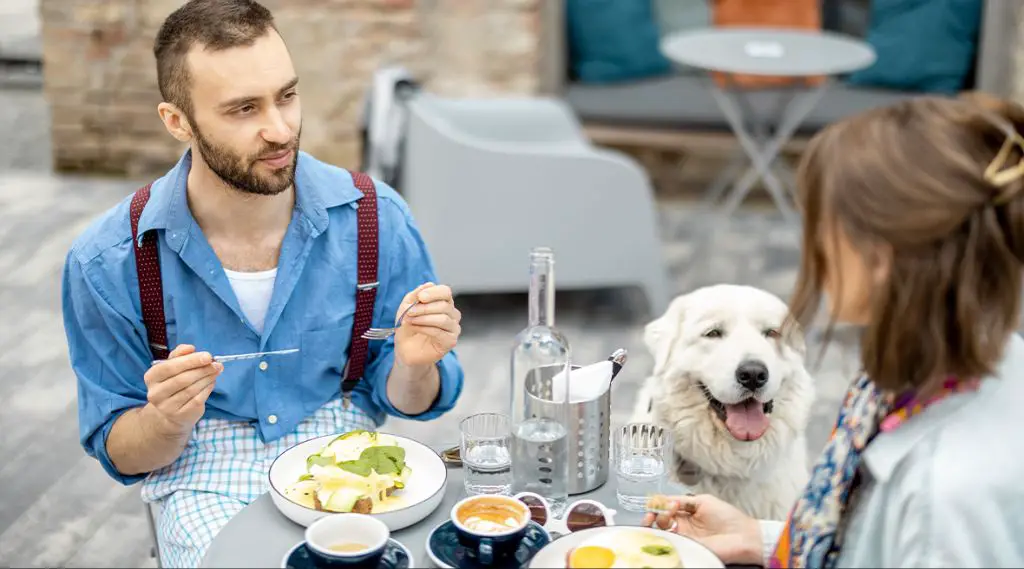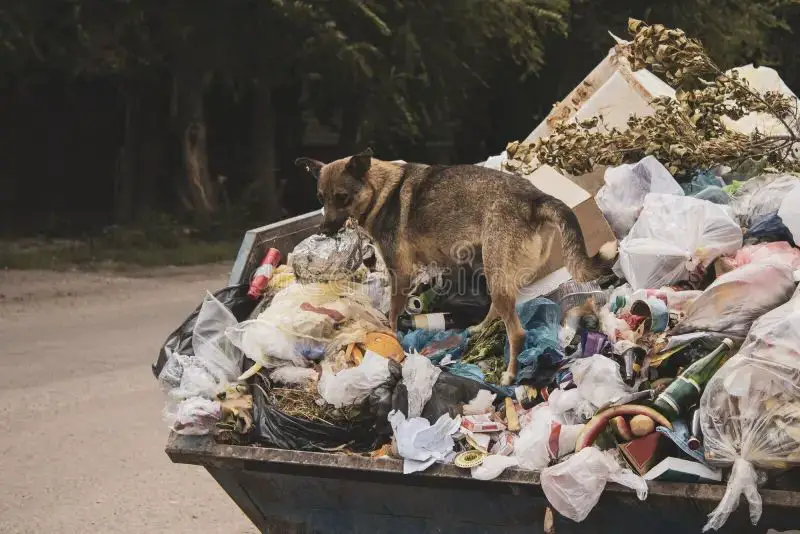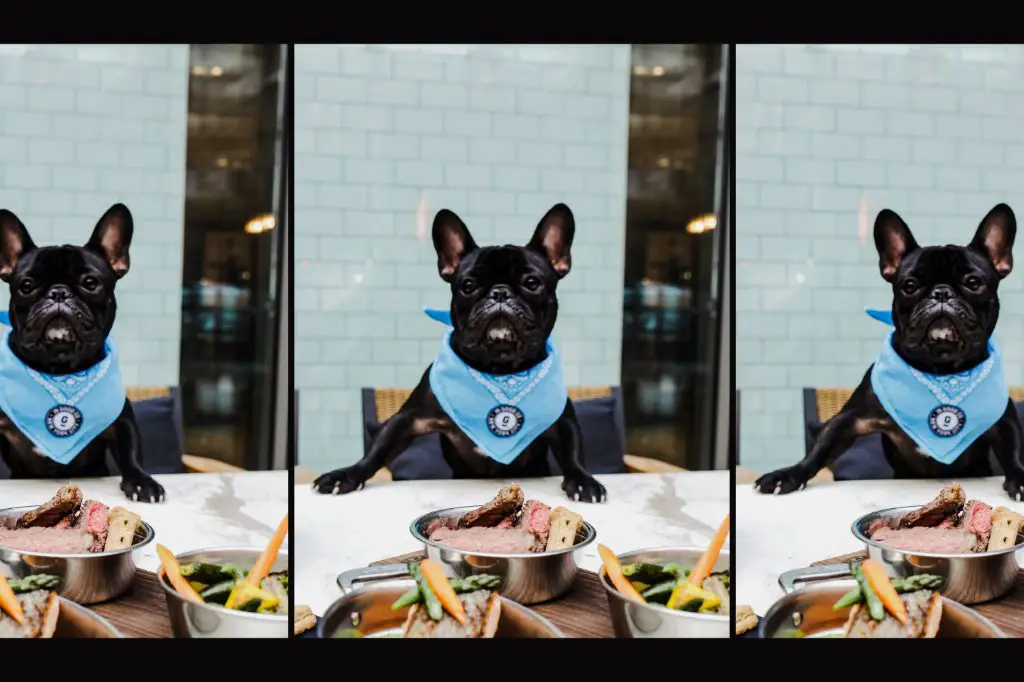Introduction
The French are famous for their love of food and dining. An essential part of French culture is taking time to savor a meal at the dinner table. Dining out at restaurants is considered an important social occasion in France.
With this dining culture comes strong opinions about handling leftovers. Many French restaurants have historically frowned upon providing diners with doggy bags or taking home uneaten food from a meal.
This view comes from an emphasis on freshly prepared cuisine and not wanting to diminish the dining experience. There is also a stigma attached to asking for leftovers in France, as it may signal you were unable to appreciate the chef’s creation.
However, with growing concerns over food waste, attitudes and policies regarding doggy bags in French restaurants are gradually changing.
History of French Dining Culture
The modern French dining culture with multiple courses has its origins in aristocratic banquet feasts dating back to the Middle Ages. Lavish multi-course meals were a way for French nobility and royalty to showcase their wealth and status. While commoners ate simpler, home-cooked meals, the upper class dined on elaborate dishes meant to impress their guests.

In the 17th and 18th centuries, during the reign of Louis XIV, French cuisine became codified and formalized in cookbooks. Haute cuisine was characterized by intricate preparations, sophisticated presentation, and multiple courses. This codification of French cuisine established the tradition of dining as a drawn-out culinary experience lasting many hours and consisting of numerous dishes.
The traditional structure of French meals comes from this history of aristocratic excess. A proper French meal is expected to follow the order of apéritif, entrée, plat principal, salad, cheese course, and dessert. Each part of the meal serves a purpose in the overall dining experience.
The Doggy Bag Stigma in France
In French dining culture, asking for a doggy bag is traditionally seen as uncultured and cheap. There are several reasons behind this stigma:
Firstly, leaving food on your plate is considered a compliment to the chef. It implies you have been served more than enough and demonstrates appreciation for the quality and quantity of the meal.
Secondly, doggy bags are seen as something for the needy who cannot afford the meal. In a culture that values etiquette and appearances, it can be embarrassing to ask for leftovers.
Thirdly, fresh, high quality ingredients are paramount in French cuisine. The food is meant to be enjoyed immediately, when flavors and textures are at their peak. Taking food home in a doggy bag doesn’t align with this priority on freshness.
Lastly, mealtime is treated as a social event in France. Focus is on conversing with tablemates, not hurrying to take food to-go.
Changing Attitudes Towards Waste
In recent years, there has been a shift in attitudes among the French public towards being more mindful about waste when dining out. This has been driven by growing environmental concerns around the vast amounts of food wasted in restaurants. With around 10 million tons of food wasted annually across France, restaurants have been identified as a key area where waste can be reduced.

There is now far greater public awareness of the major environmental impacts of food waste, from the unnecessary resources like water, energy and land used in food production, to the greenhouse gas emissions generated from rotting organic waste. As such, there is now social pressure on restaurants to reduce their footprint by cutting down on food waste.
This public sentiment has helped spark new initiatives in the restaurant industry aimed at minimizing plate waste. More French restaurants are now committed to finding creative uses for ingredients that might otherwise be tossed at the end of service, or better tailoring portion sizes to reduce leftovers.
New Laws to Reduce Waste
In recent years, France has enacted new laws aimed at cutting down on food waste from restaurants. One of the most notable laws is the 2016 ruling that requires restaurants to allow customers to take unfinished food and beverages with them. This regulation stipulates that all restaurants, including cafeterias and institutional caterers, must provide doggy bags if asked by a patron.
The law against food waste not only requires doggy bags to be made available, but also bans the practice of purposefully spoiling unused food so it cannot be consumed or donated. All edible excess food must be donated to charities or food banks wherever possible. These legal obligations have made doggy bags an accepted and expected part of the dining experience in France.
While some French chefs initially resisted the mandatory doggy bag rules, fearing damage to France’s reputation for fine dining, the laws have now become standard practice across the country. They have played a crucial role in changing social attitudes and reducing waste in the food industry.
Offering Doggy Bags tactfully
Many French restaurants are now wanting to reduce food waste while still maintaining a refined dining experience. This means they need to find a middle ground when it comes to doggy bags. Here are some tips for restaurants on how to subtly offer doggy bags without damaging perceptions:

– Rather than asking “would you like a doggy bag?”, try phrasing it as “would you like me to wrap up your leftovers for you?” This helps frame it as an elegant takeaway package rather than scraps.
– Only offer takeaway packaging for food items that travel well and will still taste good the next day, such as desserts, bread, cheese, or part of a meat dish. Don’t suggest takeaway for items like limp salads or mushy vegetables.
– Invest in high quality, environmentally friendly takeaway containers and bags. This elevates the experience and makes it feel like a gourmet meal rather than fast food scraps.
– Place takeaway packages discreetly into unbranded bags. This helps guests avoid any embarrassment or perception they are taking home scraps.
– Train staff to offer takeaways in a subtle, classy manner at the end of the meal. Make it sound like an elegant service your restaurant provides rather than a necessity due to over-ordering.
– Normalize the concept by having the takeaway option noted on menus. This removes any shame or stigma guests may feel about asking.
– Highlight your sustainability efforts and how taking home leftovers reduces food waste. This taps into diners’ environmental values.
With small changes to staff training and messaging, French restaurants can begin to shift attitudes around doggy bags. The focus should be on elegance, taste and reducing waste rather than taking home unwanted scraps.
Advice for Tourists
For tourists visiting France who want to take their uneaten food home, following some simple etiquette can help avoid any awkwardness.
First, only ask for a doggy bag if you have a significant portion of food left, not just a few scraps. Politely request “le reste à emporter” or “pour emporter” rather than expecting it to be automatically offered.
Second, be prepared to take the food with you and reheat it yourself, rather than expecting it to be neatly packaged up by the restaurant staff. In most cases, you’ll be given the leftovers in the container they were served in.
Lastly, do this discreetly near the end of the meal. Don’t make a big show of bagging up food in front of other diners, as it could be perceived as insulting the portion sizes.
While attitudes are slowly changing, respecting French dining etiquette will ensure you don’t come across as rude or wasteful. With some cultural sensitivity, you can enjoy delicious French cuisine without offending local sensibilities.
Innovative Approaches
To reduce food waste while respecting dining traditions, some French restaurants have implemented creative solutions. One trend is for chefs to offer degustation menus with small, sampler-sized portions of each dish. This allows diners to try a variety of dishes without over-ordering. Some restaurants have introduced share plates meant for sampling by the entire table. This also promotes a convivial dining experience reminiscent of traditional French communal eating.

Technology has also offered innovative approaches, such as apps allowing customers to order the perfect quantity of food. Machine learning algorithms analyze past ordering data to recommend ideal portion sizes based on the diner and selected dishes. Other apps connect customers to discounted takeaway boxes of leftovers from restaurants after service.
Forward-thinking chefs have also begun experimenting with new preservation techniques like dehydrating and pickling to allow for extended storage and use of leftover ingredients. Some use the scraps from preparation for staff meals or donations, maximizing utilization of ingredients.
As reducing waste gains mainstream appeal, an increasing number of restaurants implement creative solutions to balance tradition with sustainability.
The Future
Looking forward, experts predict that the concept of doggy bags and reducing food waste will gain wider acceptance in French restaurants over time. As younger generations grow up with environmental awareness and sustainability as priorities, the stigma around taking leftovers home is likely to fade. Already, in major cities like Paris, attitudes towards doggy bags are shifting as cosmopolitan influences create change. While fine dining establishments may be slower to adopt the concept, even Michelin-starred chefs have started providing boxes for leftovers. Government initiatives and laws against food waste will also continue pushing the restaurant industry to reform traditional practices. Initiatives educating tourists on how to politely request a doggy bag have helped pave the way. Though some older French diners may still turn up their noses at the idea, doggy bags are poised to grow as a common custom that saves money and reduces waste.
Conclusion
In summary, France historically had a stigma against taking leftovers home from a restaurant. This was related to fears about appearing cheap or desperate. However, with new anti-waste laws and younger generations rejecting such stigmas, attitudes are gradually changing. Many restaurants now offer or allow doggy bags if asked discreetly. Tourists shouldn’t be afraid to request a doggy bag if they have leftovers, but should be sensitive to cultural norms. With innovations like artful packaging and apps to request leftovers, policies and attitudes will likely continue modernizing. Overall, while France may have resisted doggy bags in the past, the tide seems to be turning towards reducing food waste. The future looks promising for French restaurants to embrace eco-friendly doggy bags while upholding their reputation for culinary excellence.